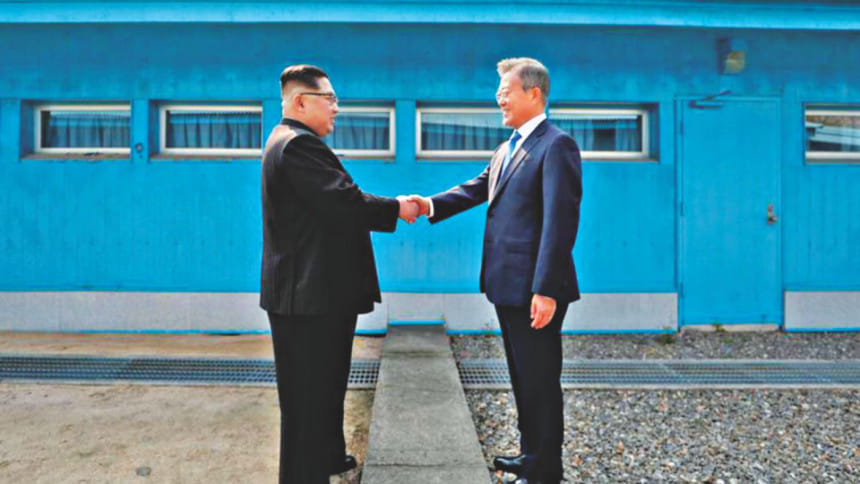A Korean Super Moon?

If 2018 was meant to be the year of the "moon", we have not been disappointed. There was the March 31 Blue Moon, that is, when the full moon appears for the second time in a month. Then there was the January 31 Super Blue Blood Moon, when the blue moon combined with a "super moon" (being closer to the earth by 15,000 miles than routinely, it appears 30 times larger), and a total lunar eclipse, causing a reddish hue, dubbed the "bloody moon". A Super Blue Moon last appeared in 1866, though its very next visit, in 2037, may still be eclipsed by yet another "moon" event: the April 27, 2018 Moon-Kim Summit.
At the very spot where the armistice was signed on July 27, 1953 to end the Korean War, two Korean leaders, Moon Jae-in and Kim Jong-un, chatted for 45 breathtaking minutes to convert the 38th Parallel into a 38th Peace Zone. Pledges were made for a war-free and nuclear-free Korea, split-family reunion, and ultimately an agreement this year, while pushing more peace exchanges immediately.
The last Cold War citadel fell owing to two triggering events: Moon's May 2017 election victory on a platform to reunify the peninsular; and "Rocket Man's" equally abrupt about-turn from firing inter-continental ballistic missiles in suddenly flinging Cupid arms. Both looked so naturally committed to peace, while smiling more effusively than any estranged partners, that even the warmest political hug of the year, between French President Emmanuel Macron and his US counterpart Donald J Trump, in Washington this very romantic week, pales into insignificance. Of course, Moon and Kim were not two long-lost friends meeting after 65 years, but we will still need a morning-after pinch to return to realities.
First off, neither could have done what they did had they not had the blessings of their "caretakers": China for North Korea and the United States for South Korea. On the eve of the March 31, 2018 blue moon, Kim travelled abroad for the first time as leader, in a concealed carriage nonetheless, to China, a country that repulsed General Douglas MacArthur's troops at the Yalu River border to prevent a united republican Korea from happening in 1950, then by propping up a tottering economy, and finally pushing Kim into reconciliation of sorts against a preying US Seventh Fleet last year. Similarly for South Korea, where 35,000 US troops remain, that too at a time when comprehensive foreign disengagement has been made top-priority by a US president for the first time after World War II. That ex-CIA director Mike Pompeo clandestinely visited Kim in North Korea before he became Secretary of State this week, and Kim's sister, Kim Yo-jong, crossed pathways with Ivanka Trump at the PeongChang Winter Olympics this February, set the stage. No wonder the Moon-Kim Summit is already talking of a four-power resolution of the 68-year peninsular conflict: sanguine Moon merely wants to deliver his electoral pledge, Kim to perhaps rock-n-roll US audiences as Soviet Union's Mikhail Gorbachev did in a different era to thaw another stubborn conflict.
Ripples flow in every direction. On the one hand, Korean peace and unity sets the stage for an eventually powerful entity between the extant regional behemoths: China and Japan. On the other, how a tyrant demonstrating capacities to negotiate with, rather than annihilate, domestic political opponents, opens more questions than all the gleams, hopes, and smiles beckoned by the Moon-Kim Summit.
Japan rightfully carries concerns, as would any country over whose territory nuclear missiles flew as a warning, even experimentally. Shinzo Abe has been politely supportive, but must stoically monitor any and every follow-up measure. Even as a facilitator of the Moon-Kim Summit, China will remain wary on two counts: that the United States does not end up more advantageously placed in Korea than presently, especially with a Kim-Trump Summit forthcoming, and which may rival this one in stature and substance; and the growth of a united and vibrant Korean economy, since China's tapering growth rate might encounter new rivalry in its own backyard. Both China and Japan may also face a zero-sum circumstance should Korea tilt one way, thus upsetting the other. Japan must prepare for two possible rivals to its west; China for looser Korean controls.
Indeed, this Korean unity might best appeal to the United States. On the one hand, it would help offset the relative bilateral advantage slipping to China from the United States, both economically and politically/militarily, which is one of the prime Trump campaign scoring points; yet, on the other, given North Korea's total dependence on China and South Korea's wariness of Japan stretching over a century ago when Japan colonised Korea, both these Korean countries might find in the United States a more "honest broker" than the heavy-handed China and the condescending Japan (where so many low-waged Korean migrants have long complained of lesser treatment, not to forget the sleazy symbolic leftovers of Japanese soldiers raping Korean women a century ago). What a bonanza moment that would be for the blank, rudderless US foreign policy under the Trump presidency: Kim could conceivably win Trump's re-election for him two years ahead of time, outside a polling booth, and as far away from the United States on earth as possible.
Many rippling years must pass before we see the dust settle on any of these fronts: gestures beginning with the Kim-Trump Summit must outshine the Moon-Kim Summit glow and be reciprocated, a process likely to hither and thither for quite some time; but the domestic Korean contexts must also be brought in, awakening perhaps the biggest unknown variables.
Moon's rise to power sealed the fate of South Korea's most important family during the intra-Korea conflict years, and with it a large segment of supporters who profited during their corrupt years (Park Chung-hee, president 1963-79; and his daughter Park Geun-hye, 2013-17, who languishes long-term in jail). In addition are the generations born after the Korean conflict began, who may have diminishing interest in the North Korean fracas, particularly if they have to compete with low-waged North Koreans for jobs in a united Korea. It will not be an easy sale south of the 38th Parallel, but even north of it, opening up a cowed-down society cannot happen by command, or as rapidly as South Koreans accepting North Koreans. Very much like the two German countries after 1989, streamlining haves and have-nots might become increasingly challenging, particularly if they produce progressive and populist outcomes, as they are doing in segments under West Germany and East Germany, respectively, today. What next with Kim's unfolding telegenic skills now that he has been seen tapping toes to South Korean music inside North Korea is anyone's guess: he is as likely to become an international star in the way he has forced himself to become at home, with even a view of securing the Nobel Peace Prize at some point, as he is to mow down fellow citizens, as he did his own uncle in December 2013.
We may be in for some very interesting times, as is often said in this tumultuous 21st century, with the band only just striking up.
Dr Imtiaz A Hussain is the head of Global Studies & Governance Program at Independent University, Bangladesh.





Comments